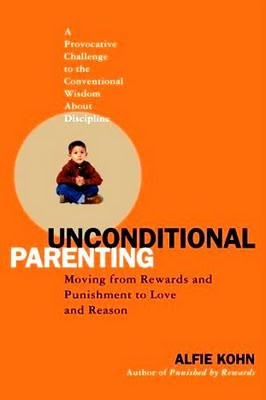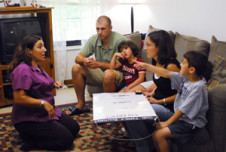Most books about parenting offer tips for handling kids when they act up: how to get them to go to bed without a fuss; how to cure their picky eating habits; how to stop them from talking back. But Alfie Kohn wants to dissuade parents from making obedience their ultimate goal. Instead, Kohn, who has been writing about parenting and education for more than 20 years, says that parents need to ask themselves, “What are your long-term objectives for your children?”
“Unconditional parenting” is the term that Kohn uses to describe a relationship where the quality and quantity of parental attention is not limited to punishing a child’s bad behavior and rewarding good behavior. Time-outs, positive re-enforcement, natural consequences, and other commonly prescribed parenting techniques have no place in unconditional parenting. Kohn argues that when we rely on external motivators such as rewards and punishments, we are teaching our children that their worth depends on their actions. Unconditional parenting, on the other hand, assumes the best of the child before us and tries to address the whole person, not just the unwanted behavior.

For example, Kohn describes a tantrum his then four-year-old daughter, Abigail, had soon after the birth of her brother. While conventional advice would recommend withdrawing parental attention or removing privileges as a “natural” consequence, Kohn says the right response would be to give children like Abigail more attention—perhaps through a special storytime—to address the problem behind their tantrums. He suggests that it is when our children are at their very worst that they need us the most. “Unconditional parenting assumes that behaviors are just the outward expression of feelings and thoughts, needs and intentions,” he writes. If we leap to punish the “bad” behavior, we are effectively telling our children that they mean less to us when they act up, and we miss an opportunity to address deeper issues.
Kohn has two children and understands that day-to-day life threatens to overwhelm even the most conscientious parent. But he strongly encourages his readers to begin questioning their methods and motives. “All of us have considerable room for improvement,” he writes. “This is as good a time as any to turn things around.” He bolsters his arguments with copious footnotes and 12 pages of references, as well as by sharing numerous real-life stories about his own experiences and epiphanies.
Kohn marshals all this information to make a persuasive argument. Readers who are interested in raising moral and compassionate children will be challenged and inspired by Unconditional Parenting.





Comments
Thanks for this book review. I am interested in
learning the principles of Alfie Kohn. I do believe that
proactive parenting is more effective than reactive
parenting. Just like what in mentioned in the post,
being a reactive parent, you focus on what you should
do in order for your child to stop with their bad
behaviors. I am eager to read the principles of Kohn
and how really “Uncoditional Parenting” works.
Jerry | 10:33 pm, May 17, 2011 | Link
I do believe that
proactive parenting is more effective than reactive
parenting. Just like what in mentioned in the post,
being a reactive parent,
tarjetas de visita | 7:22 am, January 22, 2012 | Link
Another great article I am sending to my daughter! I actually think I will find the book and send it to her… Thank you!
Marcia | 12:13 pm, February 21, 2012 | Link